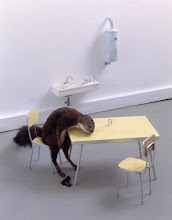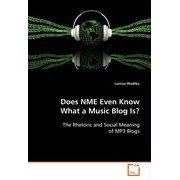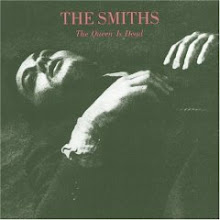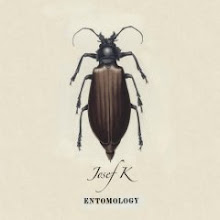
I'm quite a fan of now defunct band Gorky's Zygotic Mynci (unfortunately, I only really got into them right before they broke up) - they've been criminally underrated and overshadowed by fellow Welsh bands with experimental, yet pastoral/psychedelic, tendencies like Super Furry Animals. Their gentle blend of folk, psychedelia, and wonky experimentalism has always given me a sunny feeling of endless fields of flowers in summer. A fair part of the appeal had always been lead singer, Euros Childs' distinctive vocals that sound like he's singing in Welsh even during the times when he actually isn't - there's something very lyrical and foreign to his sound and there's a little bit of Bryan Ferry's warble in there sometimes as well. So, when he went solo, I took interest, and I've actually been finding it rather difficult to keep up with the man; it seems every time I turn around, he's released another album. In 2006, he released his debut album, Chops, which was an impressive beginning with more bouncy, gentle songs that veered between folk, country, and 50s rock and could have been on a GZM album, and then a year later, he released both Bore Da and The Miracle Inn; the former being a completely Welsh language record with rockier leanings, and the latter being more of a return to plonky piano-based tunes and English lyrics, including the rather epic title track. You get the impression that Childs just does as he pleases independent of its viability - it's like he can't help but be creative at all times, thus his output is constant and generally faster than most other artists out there. Now he released his fourth album, Cheer Gone, this past month, and Childs has continued to do what he does best: offbeat folk blended with multiple older styles. This time, mind, he has opted to dwell in a darker place lit by sputtering candles of happier memories.
The song, Autumn Leaves, begins the record with a lazy, sauntering twang that belies the fact this album was recorded in Nashville and sounds precisely like the lyrics say: "we're just walking through autumn leaves." I could picture it being on the GZM album Sleep/Holiday, and I wish I had been aware of it for my autumn mix a few weeks back. Continuing with a seasonal theme, the second track, Summer Days, is also laidback and Childs' voice lulls me like a comfortable hammock in warm sun. Injecting some livelier energy, Her Ways is a rippling number with a folksy backbeat, recalling a simpler, pastoral time that likely never really existed in the first place. And speaking of older times, the following song, Nineteen Fifties, speaks to the utopian conception of an older, ostensibly happier, decade while it shuffles back and forth like teenagers on their first date at a sock-hop. As Childs beseeches the stars to answer why "she's still in my mind," he could be asking the universal question "why do teenagers fall in love?". Conjuring up a darker mood, My Love is Gone sounds like an old Celtic lament mixed with banjos from the American deep south. Serving as a perfect interlude between two dark songs, Always Thinking of Her uses a lovely piano melody to temper a raw sadness. Farm Hand Murder returns to the dark currents of My Love is Gone as it spins the story of a doomed maiden from the perspective of the murderer as Childs' vocals cling and then slip from black precipices of minor chords - it is the most haunting song I've ever heard from him.
Saving Up to Get Married once again falls into an older, picturesque time when love was a constant and you dream of marrying and living in "a cottage in the country with roses outside the door." O Ein Dear is the only Welsh track on this particular record, and though, I can't understand the lyrics, the gloomy, almost medieval, feel of the music conveys further reasons why the cheer may be gone. Medicine Head is a solemn hymn of heartbreak and memory with organ and harmonica complementing each other to brilliant effect. The album concludes rather surprisingly with the briefer Sing Song Song, a banjo-inflected and fiddle-strewn squaredance sort of number, which I suppose I can either interpret as a complete anomaly, an antidote for the wistful sadness permeating the rest of the album, or as a rather ironic twist where the narrator must "sing a little song" to comfort himself for an apparent loss and memories that won't leave.
There is definitely something of an old soul about Euros Childs - he spans several genres while his voice and lyrics speak to some ancient way of life that is both as old and as magical as the mysterious precambrian rocks in Wales. In an odd way, his music feels like how an old wood-cut image would sound, steeped in history and preserved in smoke. This record, as its title suggests, is in a more melancholic vein than previous albums, but it is no less beautiful than Childs' earlier humour-filled, upbeat tracks. I have a feeling that Euros Childs has been just as underrated as his former band, and that's a shame when he can produce such a broad spectrum of emotions from unbridled celebration to dusky brooding, from bright green hills to vales shot through with rain. Please check this album out before he releases another one - he could be doing it as I write this.
Farm Hand Murder - Euros Childs
O Ein Dear - Euros Childs
The song, Autumn Leaves, begins the record with a lazy, sauntering twang that belies the fact this album was recorded in Nashville and sounds precisely like the lyrics say: "we're just walking through autumn leaves." I could picture it being on the GZM album Sleep/Holiday, and I wish I had been aware of it for my autumn mix a few weeks back. Continuing with a seasonal theme, the second track, Summer Days, is also laidback and Childs' voice lulls me like a comfortable hammock in warm sun. Injecting some livelier energy, Her Ways is a rippling number with a folksy backbeat, recalling a simpler, pastoral time that likely never really existed in the first place. And speaking of older times, the following song, Nineteen Fifties, speaks to the utopian conception of an older, ostensibly happier, decade while it shuffles back and forth like teenagers on their first date at a sock-hop. As Childs beseeches the stars to answer why "she's still in my mind," he could be asking the universal question "why do teenagers fall in love?". Conjuring up a darker mood, My Love is Gone sounds like an old Celtic lament mixed with banjos from the American deep south. Serving as a perfect interlude between two dark songs, Always Thinking of Her uses a lovely piano melody to temper a raw sadness. Farm Hand Murder returns to the dark currents of My Love is Gone as it spins the story of a doomed maiden from the perspective of the murderer as Childs' vocals cling and then slip from black precipices of minor chords - it is the most haunting song I've ever heard from him.
Saving Up to Get Married once again falls into an older, picturesque time when love was a constant and you dream of marrying and living in "a cottage in the country with roses outside the door." O Ein Dear is the only Welsh track on this particular record, and though, I can't understand the lyrics, the gloomy, almost medieval, feel of the music conveys further reasons why the cheer may be gone. Medicine Head is a solemn hymn of heartbreak and memory with organ and harmonica complementing each other to brilliant effect. The album concludes rather surprisingly with the briefer Sing Song Song, a banjo-inflected and fiddle-strewn squaredance sort of number, which I suppose I can either interpret as a complete anomaly, an antidote for the wistful sadness permeating the rest of the album, or as a rather ironic twist where the narrator must "sing a little song" to comfort himself for an apparent loss and memories that won't leave.
There is definitely something of an old soul about Euros Childs - he spans several genres while his voice and lyrics speak to some ancient way of life that is both as old and as magical as the mysterious precambrian rocks in Wales. In an odd way, his music feels like how an old wood-cut image would sound, steeped in history and preserved in smoke. This record, as its title suggests, is in a more melancholic vein than previous albums, but it is no less beautiful than Childs' earlier humour-filled, upbeat tracks. I have a feeling that Euros Childs has been just as underrated as his former band, and that's a shame when he can produce such a broad spectrum of emotions from unbridled celebration to dusky brooding, from bright green hills to vales shot through with rain. Please check this album out before he releases another one - he could be doing it as I write this.
Farm Hand Murder - Euros Childs
O Ein Dear - Euros Childs





















































No comments:
Post a Comment